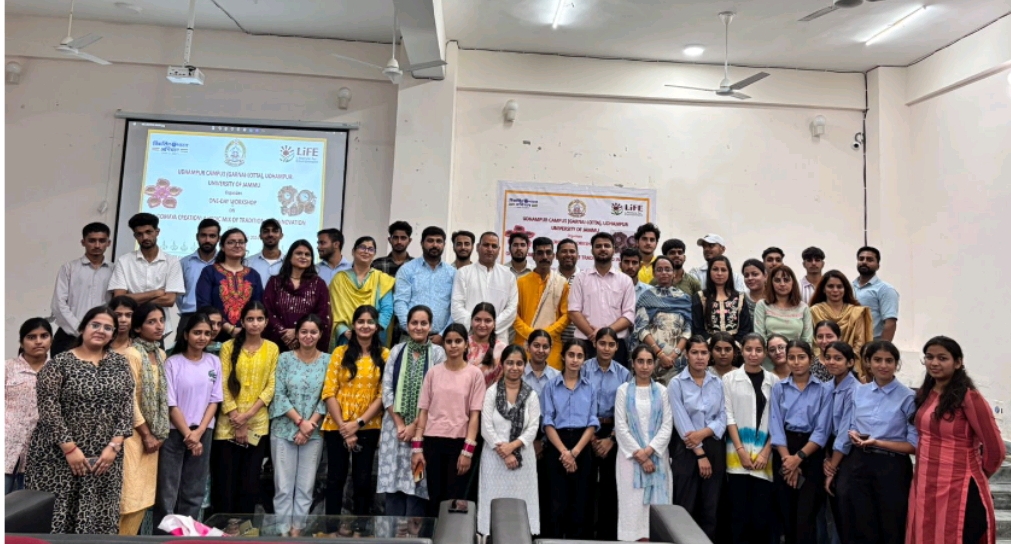About University

Cradled in the lap of mountains at the foothills of auspicious Trikuta, besides the river Tawi at an altitude of 1030 ft. is Jammu. This 'city of temples' has many places...
The Udhampur Campus (Garnai-Lotta) of the University of Jammu organized a one-day workshop titled “Gomaya Creation: A Vedic Fusion of Tradition and Innovation,” promoting sustainable practices by blending traditional wisdom with modern innovation. The workshop was organized under the concept of ‘Indigenous Products” envisaged by Prof. Umesh Rai, Vice-Chancellor of the University of Jammu. The workshop aligned with the Viksit Bharat Abhiyan 2047 and the Lifestyle for Environment (LiFE) initiative, encouraging participants to adopt plastic-free lifestyles and incorporate eco-conscious practices rooted in Indian traditions and values.
Sh. Manohar Lal Sharma, a Master Trainer in low-cost indigenous technologies and Pandit Vijay Raina, Incharge Go Sewa Trust for Jammu, Kashmir, and Ladakh, were the resource persons. During the workshop, the resource persons shared profound insights into the benefits of Indian cows highlighting Panchtantra qualities of their milk, ghee, curd, urine, and dung collectively serving multiple purposes for health, agriculture, and sustainability. Focusing on the concept of sustainable Goal 3 of promoting ‘Good Health and Well-Being’, Pandit Raina explained that Indian cow’s milk, curd, and ghee are not only nutritious but also possess medicinal properties, contributing to a balanced diet and overall well-being. “Cow urine and dung have significant agricultural, medicinal, and environmental uses, serving as natural fertilizers, pest repellents, and ingredients in Ayurvedic remedies”, he informed the participants.
 During the hands-on training session, Sh. Sharma provided training to the students and faculty members of Udhampur Campus to the craft various items such as Diyas, Keychains, Decorative objects, Dhoop sticks, Incense holders, clock and mirror frames, Shree Chakra designs, door hangings, etc. out of the dough mixture containing cow dung, multani mitti (Fuller’s earth), and a binder, enabling them to create various unique and artistic products. Simultaneously, Mr. Sharma also elaborated on the antimicrobial properties of cow dung and its usefulness in organic farming and pest control. He emphasized the biodegradable nature of cow dung-based products, which offer eco-friendly alternatives to plastic. Participants also explored the role of cow dung in bio-energy projects and sustainable construction, showcasing its value in achieving environmental goals. The products made during the workshop reflected how traditional materials can be effectively utilized in innovative sustainable solutions.
During the hands-on training session, Sh. Sharma provided training to the students and faculty members of Udhampur Campus to the craft various items such as Diyas, Keychains, Decorative objects, Dhoop sticks, Incense holders, clock and mirror frames, Shree Chakra designs, door hangings, etc. out of the dough mixture containing cow dung, multani mitti (Fuller’s earth), and a binder, enabling them to create various unique and artistic products. Simultaneously, Mr. Sharma also elaborated on the antimicrobial properties of cow dung and its usefulness in organic farming and pest control. He emphasized the biodegradable nature of cow dung-based products, which offer eco-friendly alternatives to plastic. Participants also explored the role of cow dung in bio-energy projects and sustainable construction, showcasing its value in achieving environmental goals. The products made during the workshop reflected how traditional materials can be effectively utilized in innovative sustainable solutions.
Earlier, Prof. Yash Pal Sharma, Rector of Udhampur Campus, virtually expressed his appreciation thanked the resource persons, participants, and organizing team for their enthusiastic involvement in the workshop. He reaffirmed the Udhampur Campus’s commitment to fostering innovation, sustainability, and environmental consciousness, inspiring students and the community to contribute meaningfully towards a greener and more sustainable future.
Proceedings of the workshop were conducted by Dr. Ritika Sambyal, Faculty of Commerce at Udhampur Campus